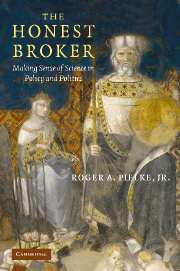Book contents
- Frontmatter
- Contents
- List of figures and tables
- Acknowledgments
- 1 Four idealized roles of science in policy and politics
- 2 The big picture, science, and democracy
- 3 Science and decision-making
- 4 Values
- 5 Uncertainty
- 6 How science policy shapes science in policy and politics
- 7 Preemption and the decision to go to war in Iraq
- 8 When scientists politicize science
- 9 Making sense of science in policy and politics
- Appendix: Applying the framework
- Notes
- References
- Index
1 - Four idealized roles of science in policy and politics
Published online by Cambridge University Press: 05 June 2012
- Frontmatter
- Contents
- List of figures and tables
- Acknowledgments
- 1 Four idealized roles of science in policy and politics
- 2 The big picture, science, and democracy
- 3 Science and decision-making
- 4 Values
- 5 Uncertainty
- 6 How science policy shapes science in policy and politics
- 7 Preemption and the decision to go to war in Iraq
- 8 When scientists politicize science
- 9 Making sense of science in policy and politics
- Appendix: Applying the framework
- Notes
- References
- Index
Summary
Imagine that a visitor has come to town to see you, and wants to find some place in town to eat dinner. Being a local, you have expertise that may be useful in helping the visitor make a decision about where to dine. How might you provide information relevant to the decision on where to eat?
This chapter uses this story, with you as the central character, to illustrate four different ways in which you might interact with your guest. These four modes of interaction are very much ideal types; the real world rarely conforms to such distinctions. But the four different roles in fact do reflect practical differences in how scientists (and other experts) relate to policy and politics. Behavior by scientists providing counsel to decision-makers does necessarily approximate one ideal type more or less than another. Thus, these four different roles, while idealized, do reflect that scientists face practically meaningful choices in how they act in the context of policy and politics.
One choice that you might make in providing advice to your visitor is to serve as a Pure Scientist. You may decide that you really have no interest in the visitor's decision-making process and simply want to share some fundamental information about factors involved with nutrition. So you might provide your guest with a copy of the US government's official report, Dietary Guidelines for Americans, which describes the characteristics of a healthy diet.
- Type
- Chapter
- Information
- The Honest BrokerMaking Sense of Science in Policy and Politics, pp. 1 - 7Publisher: Cambridge University PressPrint publication year: 2007

